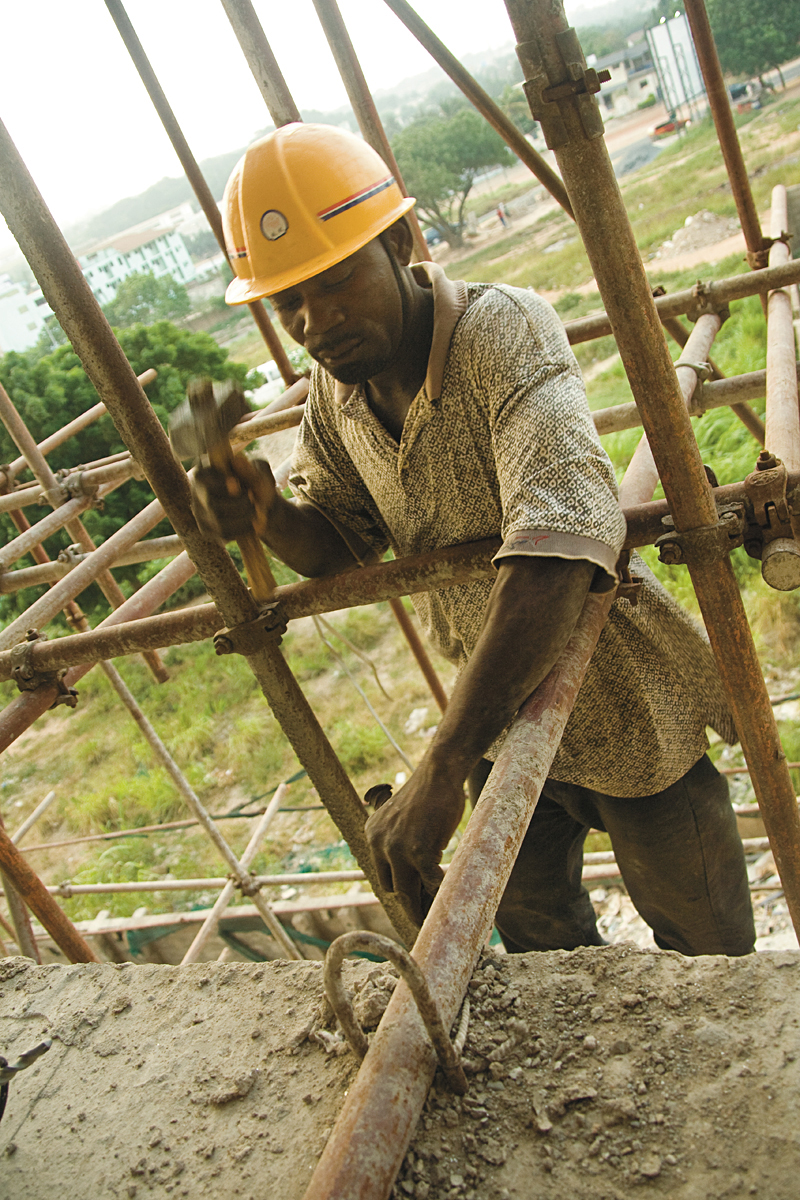Ghana is the center of international attention after an oil discovery
Story by Mat Wolf
Photos by Courtney Hendricks
As the BP oil spill disaster played out in the Gulf of Mexico this past spring, another offshore drilling story was beginning to heat up in the Gulf of Guinea 7 miles off the coast of Ghana, West Africa. From the palm tree-lined beaches of Ghana’s Cape Three Points, the small silhouette of an oil drilling platform can be seen rising from the waves.
In recent years, the West African coast has become prime real estate for oil exploration interests as they seek to discover the next great mother lode of black gold. With a resource as important to the world’s economy as oil, foreign investors scramble to stake their claim on a piece of the action, and Ghana, so far, has been no exception to this rule.
In December 2007, an exploratory mission led by the Texas-based energy group Kosmos uncovered an estimated four billion dollars worth of crude oil just off the Ghanaian coast. As a result, transnational entities have been lining up to take advantage of Ghana’s potential oil wealth. Frontrunners among them are Chinese and U.S. interests. The fact that this discovery came as Ghana celebrated its fiftieth year of independence from Great Britain gave the site its name, “The Jubilee.”
Development and oilrig construction on the Jubilee is, at times, a slow and drawn out legal process. The Ghanaian government maintains that the state-owned Ghana National Petroleum Company (GNPC) should own production rights to the Jubilee even though American-owned Kosmos conducted the initial onsite drilling and rig construction with Ghanaian cooperation.
Production on the Jubilee is scheduled to begin November 2010, but rights to oil production continue to be contested. Industry watchers speculate that Ghana wants to sell the rig and the refining rights to Sinopec, a publicly traded Chinese company with more than 75 percent of its shares owned by the Chinese government. Many Chinese companies in West Africa operate with a similar model, making it difficult to differentiate between corporate and diplomatic interests.
China is certainly interested in Ghana’s future oil industry, but in recent years, it has also taken on a major role in developing capital city Accra’s skyline and road system. By providing much needed infrastructure and local development, Chinese (state owned) companies gain the kind of political influence that is increasingly important for a superpower on the rise—influence that can determine a nation’s access to lucrative finite resources and global competitive advantage.
A new office building is under construction in a formerly deserted lot across from Accra’s Kotoka International Airport. A skeleton of scaffolding encompasses the building’s twelve-story frame. Approximately sixty Ghanaian men bustle about the construction site in old mismatched clothes and red hard hats. On hot days, many of these men forgo shirts altogether.
Uniformed in crisp blue work suits and yellow hats, another caste of workers directs the Ghanaians. They guide the Ghanaian labor and conduct some of the more technical aspects of the building’s construction, like electrical wiring.
On the back of their blue suits reads in English letters “Ke Yuan,” a Chinese contractor that employs twenty or so yellow-capped workers on this site.
A Chinese man who speaks a little English and introduces himself only as Mr. Wu, says he’s in charge of the Chinese workers. He is hesitant to speak and quickly defers all questions to a Ghanaian named Tei Adiog. The press is often waived to local Ghanaian employees when dealing with Chinese privatized or government-owned companies in Ghana.
Adiog is a broad-shouldered man with a worn face, large calloused hands, and a friendly demeanor. He says he has operated in Accra’s construction industry for more than twenty years, but now that he’s older he can no longer jump up and down the scaffolding like he used to, and as a result, now performs managerial duties. Adiog has worked with Chinese contractors for approximately the last two years and says he has mixed feelings about them.
“They work hard, and they are very technically skilled. I like that,” Adiog says. “They underbid though, and that’s how they get contracts. They don’t pay as well as the Americans, and they take jobs away from Ghanaians. We need [America] here, we like America, we need the Americans.”
The Ghanaian Ministry of Energy (MOE), is abuzz with excitement these days. MOE is the wing of government that will oversee most of Jubilee operations when oil production begins in November. “With this discovery, Ghana is set to become one of the powerhouses in West Africa, as well as becoming powerful in the African continent in general,” said MOE Deputy Minister Emmanuel Armah-Kofi Buah at a shipping and marine refueling seminar held on July 14.
When asked about his government’s current negotiation with Kosmos, Buah offered only this blanket statement: “The government of Ghana is committed to ensure that Ghana succeeds in this industry, and the government of Ghana is determined to ensure that our past experiences, especially in the mining industry, are not repeated as we go forward. We are seriously in discussion to address all the issues, and to allow Ghana to win, and to allow Kosmos also to win.”
Further questions about Sinopec’s interest in the Jubilee or Ghana’s future refining capabilities were not answered.
Located on the sixth floor of the Premier Tower in downtown Accra, just down the street from most of Ghana’s government ministries, is the office of China Geo-Engineering Corporation. The Premier Tower plays host to many international investment and banking companies, but this particular firm is 100 percent owned by the Chinese government. Requests for an interview with the company’s Chinese managerial staff are quickly parlayed. Instead, a native Ghanaian assistant projects manager named Ebenezer Aceampong is made available to speak. The primary focus of Aceampong’s work with China Geo-Engineering Corporation is the Sunyani Road project, which aims to improve existing roads linking Accra to the large town of Kumasi in the center of the country. Previous projects of China Geo-Engineering include highway projects around Ghana and the construction of the Teshie Malaria Research Hospital in Accra.
Aceampong insists that Chinese companies don’t hurt Ghanaian workers. Instead, they are beneficial. According to Aceampong, the average Ghanaian China-Geo employee has a monthly salary of approximately 360 dollars. This figure is more than double the average national income as reported by the U.S. State Department.
“I like the Chinese. Their technical expertise is very good, and they are always bringing new ideas,” Aceampong says. “Since China emerged in Africa, they’ve been contributing to the infrastructure and are ready to produce at an international standard.”
The Chinese aren’t the only foreign players beginning to vie for a piece of Ghana’s oil and construction potential, but they are a new presence on the African continent compared with European and American influences that traditionally held sway here. As the Chinese middle class explodes, the demand for manufactured goods has skyrocketed. Now China needs raw materials and energy to further its development. To this end, the country has set its sights on the African continent.
In addition to highway development, civic projects have largely defined Chinese presence in Ghana. During the 2008 Cup of African Nations, China built or renovated four soccer stadiums in Ghana. And in 2007, China completed a restoration of Ghana’s National Theatre, a futuristic art deco building that has become a symbol of downtown Accra’s urban renewal. Ghana’s new Ministry of Defence building was also constructed with Chinese cooperation. In the hydroelectric sector, the Chinese have begun building the Bui Dam in Ghana’s Volta region of the country. The dam could allow Ghana to produce more electricity than it needs, so it can export surplus energy to its neighbors for profit.
The U.S. has not turned a blind eye to an increased Chinese presence in Ghana. To the contrary, the U.S. has a long history of political influence in the country. Following Ghana’s independence from the British, the country experienced a period of political turmoil affected by U.S.-Soviet posturing during the Cold War. In 1966, Kwame Nkrumah, Ghana’s first independent head of state, was overthrown in an American-backed coup because he was perceived to be sympathetic to communist interests. And in 1963, the U.S. established the very first Peace Corps mission in Ghana under the Kennedy Administration.
Unlike the U.S. government, the Texas-based ExxonMobil has no overt historical presence in Ghana but has made overtures to the Ghanaian government in an effort to secure extraction and drilling rights to the Jubilee. Exxon neither confirms nor denies their purported interest in Ghana, but current Jubilee holder Kosmos has signaled interest in selling to the transnational giant. In mid-July, Exxon sent a business delegation to Ghana’s presidential palace. Since then, relations between parties have not improved publicly, and the specifics of what happened at this closed-door session were not released by either faction.
Recently, Exxon has been taking out full-page ads in Ghanaian newspapers, touting the potential benefits for everyday Ghanaians if the government allows it to become involved in their energy sector—unusual behavior for a company that officially maintains it has no current or future interest in Ghana.
While the connection between U.S. government involvement and U.S. corporate interests in Ghana may seem less direct than China’s, the U.S. maintains a noticeable diplomatic presence. The American Embassy in Accra is a fortress. Polished gray walls, harsh right angles, and a ten-foot-high perimeter are guarded by numerous security cameras and AK-47-armed Ghanaian police. Security on the inside of the compound is strict as well: Private security personnel screen entrants and confiscate or hold banned items like computers, voice recorders, and thumb drives.
In contrast with the building’s hostile exterior, the embassy’s representatives are friendly and polite, if not governed by a say-nothing-and-smile protocol. They assert that the United States is popular in Ghana and reveal little besides prepackaged statements about the history of the Peace Corps in the country and the agreement made by President Obama and Ghanaian President Mills to exchange World Cup jerseys. The increased presence of the Chinese in Africa and the situation on the Jubilee are acknowledged but not discussed.
Countering the U.S. approach to diplomacy in Ghana, China has made less public overtures and instead provides the country with needed infrastructure improvements. Ghanaians may have mixed feelings about increased Chinese presence, but one thing isn’t disputed—they have more job opportunities as a result of China entering the local economy.
In what is perhaps an ironic twist, America’s famous reputation for capitalism at any cost is being overshadowed by a former Cold War rival. The Chinese offer infrastructure development at an international standard for a fraction of the cost that a Ghanaian or American firm could. It is capitalism at its finest.
As Ghana looks toward an oil rich and developed future, it will no doubt continue to be a focal point for the developed world’s economic interests, and how it reacts to these interests could well define this corner of Africa for many years to come. Ghana may not have to pick a side in this international tug of war; it could take advantage of the opportunities presented by both Chinese and U.S. companies. Kwame Nkrumah, Ghana’s first post-colonial head of state, offered an apt summary of his country’s position in a global world, a summary that continues to stand true nearly half a century later: “We face neither East nor West; We face forward.”
Categories:
Black Gold on the Gold Coast
September 26, 2010
unknown
After a 2007 oil discovery in West Africa, the U.S. and China stake their claim on Ghana’s potential wealth.
unknown
Black Gold on the Gold Coast
0
Donate to Ethos
Your donation will support the student journalists of University of Oregon - Ethos. Your contribution will allow us to purchase equipment and cover our annual website hosting costs.









